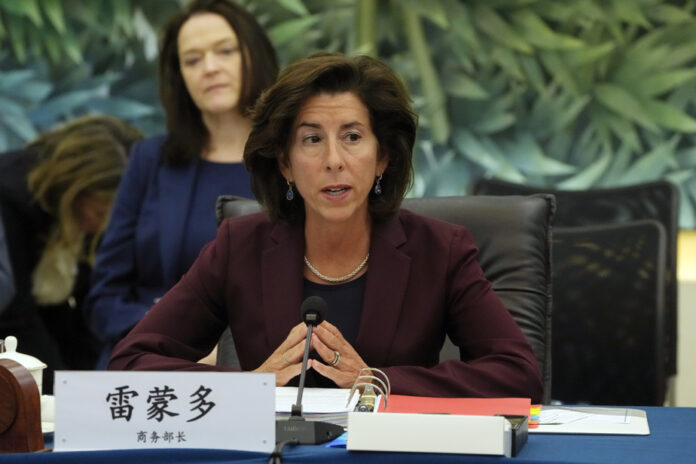(Beijing) The United States and China agreed on Monday to hold regular conversations on trade issues and access to advanced technologies. It is the latest move to reduce tensions between the world’s two largest economies.
The announcement came during a visit to Beijing by Gina Raimondo, U.S. Secretary of Commerce, who is meeting with senior Chinese officials in Beijing and Shanghai this week.
The agreement to hold talks is the latest step in mending ties between the two countries, a process undertaken during three trips since mid-June by senior US officials, Secretary of State Antony Blinken, Treasury Secretary Janet Yellen and Presidential Climate Envoy John Kerry.
“I think it’s a very good sign that we have agreed to a concrete dialogue that goes beyond vague commitments to keep talking; this is an official channel,” Raimondo said Monday night in Beijing after four hours of negotiations with Chinese Commerce Minister Wang Wentao.
The discussion with Mr. Wang was “open” and “pragmatic”, said Ms. Raimondo, adding that she expressed concerns in the US business community over recent Chinese moves against Intel and Micron Technology, two US semiconductor companies. . The Chinese government thwarted a major planned acquisition by Intel and blocked some Micron sales in China this year.
Two dialogue channels will be set up. A working group including business representatives will focus on trade issues. The other forum will allow the exchange of government information on export controls.
U.S.-China talks on trade, technology and other economic issues were once the norm, but they have waned in recent years. A year ago, China pulled out of eight bilateral forums in retaliation for a visit to Taiwan by then-House of Representatives Speaker-Elect Nancy Pelosi.
The overflight of US territory by a Chinese spy balloon last winter – which was eventually shot down over the Atlantic – has heightened tensions between China and the United States. Mr. Blinken then canceled his trip to Beijing, scheduled for February.
But a certain thaw has intervened, and these two countries with interconnected economies have opened the door to a resumption of diplomatic relations.
Even before she left for China, Republican lawmakers criticized Raimondo for planning a “task force” of US and Chinese officials to discuss US export controls. Four senior Republicans wrote to him that it was “deeply inappropriate for our chief adversary to have any influence over the controls of sensitive United States national security technology, which the American people have charged it to protect.”
According to Ms. Raimondo, this new forum is not a working group: it will exchange information on American restrictions on the export of advanced technologies, but its creation does not mean that the United States will compromise on national security issues. The first meeting is to take place this Tuesday in Beijing.
Ms. Raimondo and the Chinese Minister of Commerce agreed to meet at least once a year, she added.
The commitment to talk shows that both sides are pragmatic, says He Weiwen, a former official in China’s Ministry of Commerce, now a researcher at the Center for China and Globalization in Beijing.
However, political relations with China remain tense. In Washington, the idea of a formal dialogue structure is being criticized by some China hardliners.
Matt Turpin, visiting scholar at the Hoover Institution and former director of the China section at the National Security Council, finds this initiative incomprehensible. According to him, China does not deserve this opening because of its refusal to take action to stop the entry of fentanyl into the United States, its alliance with Russia and the hacking of Ms. Raimondo’s emails before the trip.
“Ms. Raimondo appears to have made a major concession to Beijing without getting anything in return,” Turpin said.
In Monday’s meetings, the Chinese expressed concern about declining bilateral trade and investment between the two countries, and issues related to U.S. government subsidies, a senior Commerce Department official said. On the other side, the concerns of American companies and investors have been relayed, who consider the requirements to which foreign companies are subject to be unfair. The growing opacity of Chinese economic statistics was also mentioned. This month, China stopped releasing data on youth unemployment, after the figure hit a record high earlier this summer.
Raimondo says she spoke with nearly 150 business leaders before her trip, who expressed the need for more communication channels.
Since its economic slowdown this summer, China has softened its stance on some issues. The latest measure was taken on Monday: the Ministry of Foreign Affairs announced that as of Wednesday, travelers to China will no longer be required to be tested for COVID-19.
Michael Hart, president of the American Chamber of Commerce in China, believes Chinese officials have shifted their focus this summer and are more willing to talk.
“Previously, all meetings started with five minutes where it was all the fault of the United States. Today, things have calmed down considerably. Government officials understand the importance of U.S.-China trade,” Hart said.















